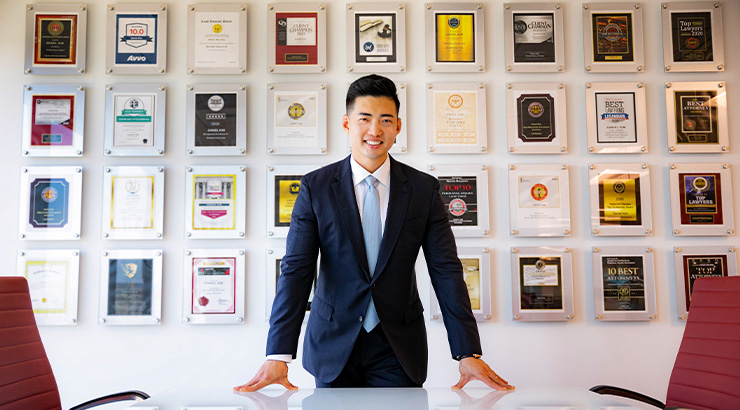
Alumni on the Move: Daniel Kim Turning Crisis into Opportunity
August 9, 2023
How does a personal injury lawyer with a strong focus on motor vehicle accident cases survive two years of shelter-in-place state mandates during COVID-19, when suddenly no cars were on the road? Alumnus Daniel Kim (JD ’12) knows that the answer to this riddle lies somewhere between having an entrepreneurial mindset and possessing an uncanny ability to turn any crisis into an opportunity.
After graduating and joining the bar, Daniel Kim focused his legal practice on an area of law he had always thought was “recession-proof,” and it proved to be a successful strategy. By 2020, Kim was heading up a leading Orange County law firm, with an excellent team of over 50 employees and a steady stream of clients coming through the door. Suddenly, in late March of 2020, the unimaginable happened.
“First it was shelter in place and then, suddenly, no one was on the road,” says Kim recounting the cultural shock that was telegraphed around the world at the start of international COVID-era lockdown mandates. “After I freaked out,” he jokes, “I had to undertake a real shift in mindset–these were catastrophic circumstances for us–who could have foreseen this?” The irony of a personal injury lawyer–someone whose job it is to help others through life-changing, devasting crises, finding himself in just such a crisis is not lost on Kim, as he describes scrambling to find a way to pivot and keep his practice running.
The era of COVID, it might be argued, gave us all a moment of pause and time to reassess things, and Kim was no different. His approach involved interrogating his practice while using the extra time on hand to examine the chronology of every case he handled, as he puts it, “to get really granular,” and find opportunities to improve the firm’s policies and procedures in every department and at every stage of a case.
The entrepreneur in Kim looked for new ways to ensure that his team conserved their time and energy through clearly defined foci, seeing to it that team members played to their strengths, and remained focused on preparing every case as if it were going to trial–as opposed to preparing cases with the aim of a settlement. In a time that is characterized by a pervasive national feeling of powerlessness and crisis, Kim’s solution was to play to his core strength and innate ability to seek opportunities in crises and use them to great advantage.
“It’s always the little things,” Kim tells me, “That make the real difference in a case. You can’t cut corners, you have to be methodical, and the time you put into it is what gets you good results.” It is this personal and focused approach that seems to serve Kim and his team well. He cites it as one of the reasons his firm not only survived the tough times of COVID-era lockdowns but almost doubled in size to over 100 employees to meet the demand for their services. Candidly he adds, “The small administrative details of a [personal injury] case are massively important, you don’t want to screw them up when surviving spouses and family are depending on you to get things right.”
When Kim describes himself as, being, “a perfectionist,” this highly detailed and orchestrated approach seems the only way he could run his practice. However, there were also tough lessons he had to learn as he worked to keep his firm functioning during COVID. “Perfectionism is great, but it doesn’t scale well,” he tells me. “As an entrepreneur, you have to delegate tasks. It can be difficult to give up control, but empowering your team can make them more accountable to- and invested in your goals.”
The sea change for Kim came in shifting his firm into, what he calls, “a hyper-division of labor.” This was a scaled effort to identify his team’s various skill sets and keep them focused on their best, core strengths and abilities while matching these strengths to the needs of cases to avoid his staff becoming mired in drudgery and slipping into complacency. He has high praise for his IT team which has helped implement a lot of automation, along with the ongoing interrogation of how his firm could improve the prospects and efforts of each new hire, or where they might have gotten things wrong whenever an employee exited the firm.
“At heart, a lawyer is an advocate,” offers Kim, “and at the core of advocacy is this effort to solve problems.”
There can be no doubt of Kim’s ability to pivot in crises and transform them into successes for his firm and his clients. In the process, he seems to have upended the truism that those who seek to fix issues for others, seldom have the time to fix the same issues for themselves. For Kim, COVID-19 created a crisis that bore him an opportunity to do just that, to take a hard look at his entire operation, and it gifted him the chance to do the tough work of streamlining his practice as he sought to snatch victory from the jaws of defeat. It’s hard to think of a better definition of what a personal injury lawyer is and does than the example set by alumnus Daniel Kim.

